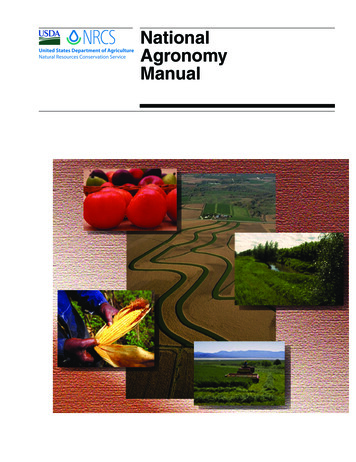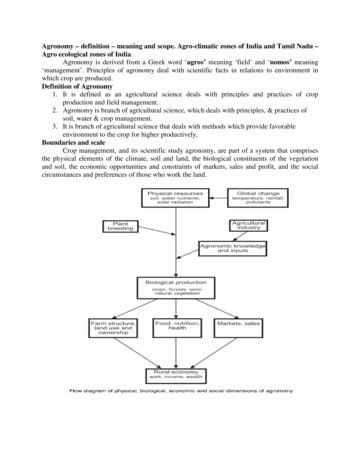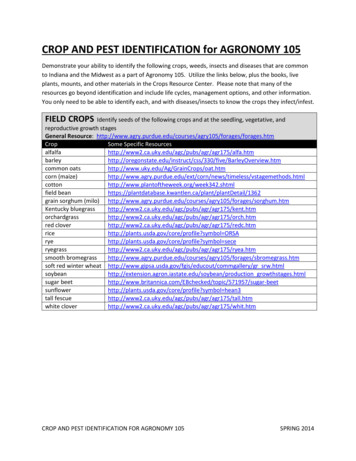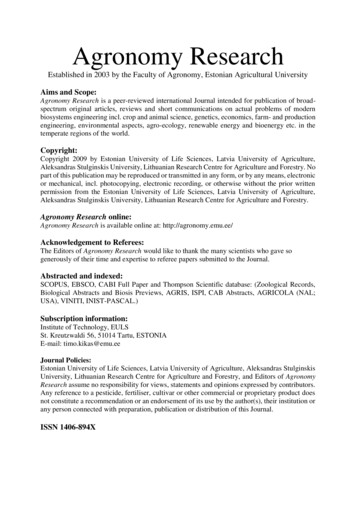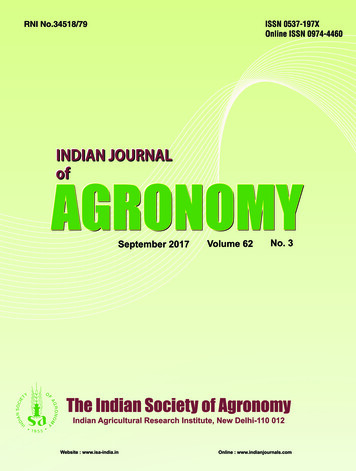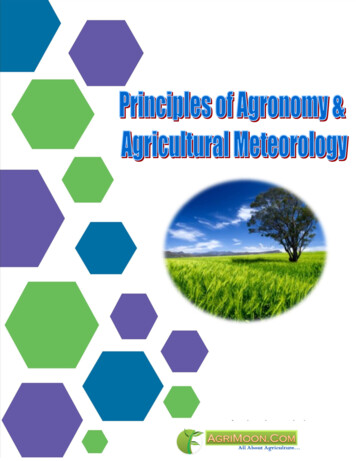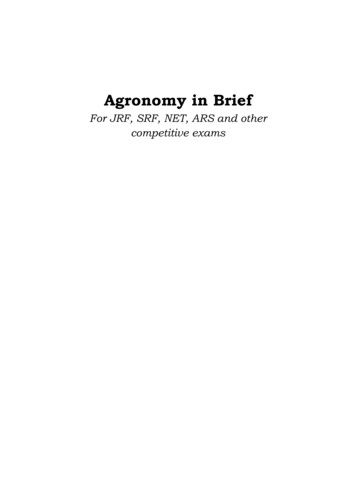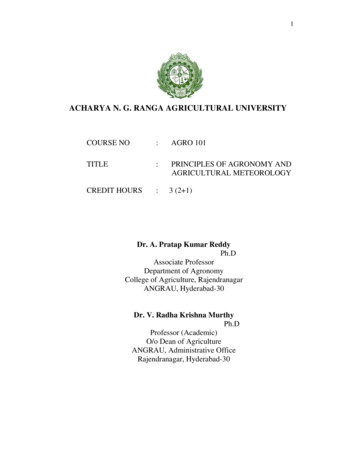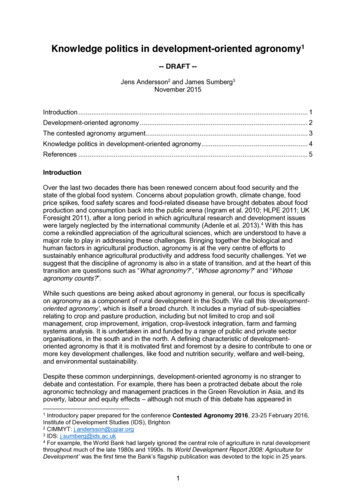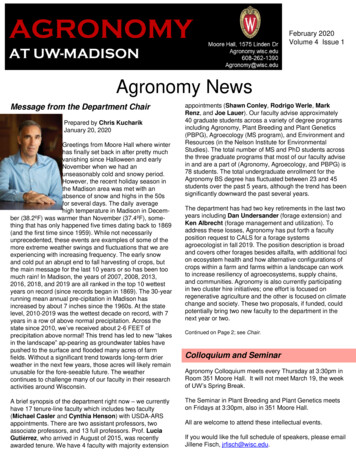
Transcription
February 2020Volume 4 Issue 1Agronomy NewsMessage from the Department ChairPrepared by Chris KucharikJanuary 20, 2020Greetings from Moore Hall where winterhas finally set back in after pretty muchvanishing since Halloween and earlyNovember when we had anunseasonably cold and snowy period.However, the recent holiday season inthe Madison area was met with anabsence of snow and highs in the 50sfor several days. The daily averagehigh temperature in Madison in December (38.2ºF) was warmer than November (37.4ºF), something that has only happened five times dating back to 1869(and the first time since 1959). While not necessarilyunprecedented, these events are examples of some of themore extreme weather swings and fluctuations that we areexperiencing with increasing frequency. The early snowand cold put an abrupt end to fall harvesting of crops, butthe main message for the last 10 years or so has been toomuch rain! In Madison, the years of 2007, 2008, 2013,2016, 2018, and 2019 are all ranked in the top 10 wettestyears on record (since records began in 1869). The 30-yearrunning mean annual pre-cipitation in Madison hasincreased by about 7 inches since the 1960s. At the statelevel, 2010-2019 was the wettest decade on record, with 7years in a row of above normal precipitation. Across thestate since 2010, we’ve received about 2-6 FEET ofprecipitation above normal! This trend has led to new “lakesin the landscape” ap-pearing as groundwater tables havepushed to the surface and flooded many acres of farmfields. Without a significant trend towards long-term drierweather in the next few years, those acres will likely remainunusable for the fore-seeable future. The weathercontinues to challenge many of our faculty in their researchactivities around Wisconsin.A brief synopsis of the department right now – we currentlyhave 17 tenure-line faculty which includes two faculty(Michael Casler and Cynthia Henson) with USDA-ARSappointments. There are two assistant professors, twoassociate professors, and 13 full professors. Prof. LuciaGutiérrez, who arrived in August of 2015, was recentlyawarded tenure. We have 4 faculty with majority extensionappointments (Shawn Conley, Rodrigo Werle, MarkRenz, and Joe Lauer). Our faculty advise approximately40 graduate students across a variety of degree programsincluding Agronomy, Plant Breeding and Plant Genetics(PBPG), Agroecology (MS program), and Environment andResources (in the Nelson Institute for EnvironmentalStudies). The total number of MS and PhD students acrossthe three graduate programs that most of our faculty advisein and are a part of (Agronomy, Agroecology, and PBPG) is78 students. The total undergraduate enrollment for theAgronomy BS degree has fluctuated between 23 and 45students over the past 5 years, although the trend has beensignificantly downward the past several years.The department has had two key retirements in the last twoyears including Dan Undersander (forage extension) andKen Albrecht (forage management and utilization). Toaddress these losses, Agronomy has put forth a facultyposition request to CALS for a forage systemsagroecologist in fall 2019. The position description is broadand covers other forages besides alfalfa, with additional focion ecosystem health and how alternative configurations ofcrops within a farm and farms within a landscape can workto increase resiliency of agroecosystems, supply chains,and communities. Agronomy is also currently participatingin two cluster hire initiatives; one effort is focused onregenerative agriculture and the other is focused on climatechange and society. These two proposals, if funded, couldpotentially bring two new faculty to the department in thenext year or two.Continued on Page 2; see Chair.Colloquium and SeminarAgronomy Colloquium meets every Thursday at 3:30pm inRoom 351 Moore Hall. It will not meet March 19, the weekof UW’s Spring Break.The Seminar in Plant Breeding and Plant Genetics meetson Fridays at 3:30pm, also in 351 Moore Hall.All are welcome to attend these intellectual events.If you would like the full schedule of speakers, please emailJillene Fisch, jrfisch@wisc.edu.
Chair (continued from Page 1)Given a trend towards declining enrollments in severalundergraduate majors in the CALS, and the overwhelmingsuccess of the Agroecology MS graduate program, theAgronomy department – and specifically Prof. RandyJackson – has been serving as a co-lead (with theDepartment of Horticulture) on the development of a new,collaborative undergraduate major focused onAgroEcosystems. The formal name and course work has yetto be approved, but the design of this new major is meant toserve what we see as a growing need for training ofundergraduates in the 21st Century. Other departmentsinvolved in the development of this undergrad major are soilscience, plant pathology, and entomology. The new major - ifapproved - wouldn’t be offered until Fall of 2021 or 2022. Thedepartment of Agronomy is also currently exploring the ideaof a merger with the department of Horticulture. An ad-hoccommittee is currently meeting periodically to discuss theidea and will report back to the respective faculties in latewinter 2020.Recent and continued budget cuts to CALS and itsdepartments (due to a downward trend in undergraduateenrollment numbers) and a new university budget model(largely based on credits following instructor) has alsochallenged us to think about how we can increase summerand online course offerings in the coming years to generatemore revenue. This has been a significant challenge givenoffering such courses during the summer conflicts with whenmost people are most scattered in the field and generallyunavailable to be teaching. Scientist Gregg Sanford and Iare currently leading the development of a new onlinecourse, hopefully to be first offered in 2021.Agronomy NewsFebruary 2020Volume 4 Issue 1Page 2Welcome!Alejandro Castro, research coordinator, de LeonGroupRyan Alpers, academic staff, de Leon GroupFernando Garcia Espolador and Julia SilvaMorosini, honorary fellows, de Leon GroupJose Carvalho de Souza Dias, post-doc, RenzGroupTaylor Schutz, lab assistant, Renz GroupLaura Paine, outreach coordinator, Jackson GroupCarl Wepking, Program Manager, Jackson GroupCaitlin Collies, Student Services CoordinatorLoren Jorgensen, project assistant, KucharikgroupSavannah Massman, graduate student, HeidiKaeppler GroupOn a positive note, for the 2019 fiscal year, Agronomygenerated 4.1M in direct expenses on grants, which rankedus 4th out of 17 departments in CALS. This is a significantaccomplishment and is a testament to the quality and hardwork of our faculty, staff, and students. We are gamechangers in our fields, but will continue to need to find newsolutions to deal with the college and budget cuts that haveleft no more “fat to trim” in our department operating budget.There are lots of other exciting things going on in thedepartment, and we hope that this newsletter brings youcloser to those activities. While we might be quite successfulin generating outside funding to conduct research, there aremany activities and accomplishments that cannot happenwithout your continued support of the department, no matterthe size of your gift. As always, we are extremely grateful forthe continued support of our alumni, emeritus faculty, staff,and other friends.On, Wisconsin!Chris KucharikSubmitted by Valentin Picasso
Agronomy NewsFebruary 2020Volume 4 Issue 1Page 3Congratulations!Haleigh Ortmeier-Clarke, grad student with Rodrigo Werle and ShawnConley, was awarded the Graduate Student Travel Award to attend the NorthCentral Weed Science Society meeting in Columbus, OH. She received firstplace for her oral presentation, “Seeding and Nitrogen Rate Influence onCanopy Closure and Weed Suppression in Industrial Hemp (Cannabis sativaL.)” She also received second place in the poster competition in SpecialtyCrops/Corn with her poster “Screening of Industrial Hemp (Cannabis sativa L.)Tolerance to Corn and Soybean Herbicides“.Haleigh is also one of 18 graduate students to receive the ASA, CSSA, andSSSA Future Leaders in Science Award. She was chosen based on herinterest and engagement in science advocacy. She will participate in a trip toWashington, D.C. next month for the societies’ Congressional Visits Day,where they will meet with members of Congress and advocate for food,agriculture and natural resources research. Well done!Lauren Jorgensen, BS 2019, was named a 2020 Rhodes Scholar finalist.Lauren earned her degree in Agronomy and Community and EnvironmentalSociology and certificates in environmental studies, food systems, and globalhealth. She was advised, in part, by Bill Tracy. Lauren is from Stillwater, MN,and is working towards her masters in public health in an accelerated programat UW-Madison. For the complete article and source, please visit this site.Lucía Gutiérrez has earned tenure! She is now an Associate Professor ofAgronomy.Mike White, grad student with Shawn Kaeppler, was recently featured in anarticle on the UW Graduate School website. The article, authored by MeganChua, highlights Mike’s work creating a family tree for corn. Mike successfullydefended his dissertation and received his PhD in January. For the article,please click here.Grad Student ProfileSarah Striegel is a 2nd year MS graduatestudent in Dr. Werle’s program at UWMadison; she is from What Cheer, Iowa, andearned her BS from Iowa State University. Sheis investigating how to optimize use ofdicamba post-emergence in RR2Xtend(glyphosate- and dicamba-resistant) soybeansystems while also mitigating potential forinjury to sensitive plant species/varieties dueto secondary movement. Her work will helpprovide recommendations to producers onhow to best utilize dicamba products in theirresistant systems.Photo:Striegel applying pre-emergence herbicide following soybean planting.Top to bottom: Ortmeier-Clarke,Jorgensen, Gutiérrez, White
Agronomy NewsFebruary 2020Volume 4 Issue 1Page 4Update from the Bean TeamSubmitted by Lindsay ChamberlainIn January the Bean Team presented research to over1,000 farmers, crop consultants, and other agribusinessprofessionals at the Wisconsin Agribusiness Classic in Madison,WI. Lindsay Chamberlain gave a talk on how cropping practicesimpact soil microbiomes, based on field research performed atthe Arlington Research Station. She emphasized that croppingpractices that have an impact on soil properties are likely tohave an impact on soil microbes as well. It is exciting to sharedata like this with growers, especially as soil biology and soilhealth become a subject of more and more interest. HaleighOrtmeier-Clarke spoke about her Wisconsin industrial hempresearch during a joint session on CBD, grain, and fiber. Haleighworked with several collaborators, including Rodrigo Werle, ona variety trial, agronomic practices trial, and greenhouse studyto determine common herbicide effects on hemp growth. Shegot a laugh from the crowd as she explained that there are notmany options for chemical weed control in industrial hemp, butthere are many options for controlling unwanted volunteerhemp! Emma Matcham presented on managing early- and lateplanted soybeans based on survey data from over 8,000 fieldsfrom 10 north-central US states between 2014 and 2017.Gathering data on over 600,000 acres of soybeans requiressupport from thousands of farmers.These surveys have been used to identify improvedmanagement system recommendations for 10 differentenvironments. Systems were tested on farms across the northcentral US in 2019 and will also be tested in 2020. You can learnmore about the experiences of our research participantsthrough the live Twitter interviews that Emma, Lindsay, andJohn Gaska facilitated across 4 states in summer of 2019. Here isa link to our interview with Keith Kemp about current researchon his farm and a link indicating the importance of check-offfunds for funding extension research.Keith is a farmer in West Manchester, OH, and a member ofthe North Central Soybean Research Program board. You cansee more of these interviews with farmers in Iowa,Wisconsin, and Illinois on Dr. Shawn Conley’s Twitter profile,@BadgerBean.Students also had the opportunity to learn from farmers andextension educators during a tour hosted by North CarolinaExtension Soybean Specialist, Dr. Rachel Vann. They learnedabout diverse southern cropping systems where rotationsinclude tobacco, sweet potato, corn, soybean, and cotton.Virginia Extension Agronomist, Dr. David Holshouser, alsobrought students to the Port of Virginia to see soybeansloaded onto ships and learn about the export process. Nextyear a tour will be hosted by Dr. Laura Lindsey, Soybean andSmall Grains Specialist at Ohio State, so that students fromthe southeastern US can learn about typical Midwesternfarms.Bean Lab grad students E.Matcham, L. Chamberlain,H. Ortmeier-ClarkeThe Bean Team graduate students all appreciate theprogram’s dedication to extension. The opportunitiesthat come with it, to both share information and learn,have significantly impacted their graduate education.The whole team is looking forward to Corn-SoybeanExpo in the Wisconsin Dells in February, which isanother great chance to interact with farmers and cropconsultants. Maintaining a connection with growers inWisconsin and around the country allows the BeanTeam to witness the impact of research and learnfirsthand about issues farmers face. It is an excitingtime to be involved in agricultural sciences!
Agronomy NewsFebruary 2020Volume 4 Issue 1Page 5Making News LocallyChris Kucharik and members of his research group were featured in“Morning Ag Clips.” Part of the article, written by Nicole Miller, isbelow.“A model solution: Researchers expand computer simulationtool to study and address nitrogen contamination.”Published on 21 November 2019MADISON — When agronomy professor Chris Kucharik and hiswife, Amy, moved into a subdivision in the Town of Burke in 2006,they weren’t surprised to learn their well water contained quite a bitof nitrate. Nitrate is the most widespread groundwater contaminantin Wisconsin, and it’s often associated with agriculture. Their home,located in rural Dane County, is surrounded by current and formerfarmlands.Their nitrate level was around 9 parts per million (ppm), below themaximum contaminant level of 10 ppm set by the EnvironmentalProtection Agency. But that still felt too high for them. Fortunately,the house came with a reverse osmosis system that filters outaround 70% of the nitrate in their drinking water. Besides changingthe filter annually, they didn’t think about it much. Set it and forgetit.Then, in 2013, Amy became pregnant, and they were jolted out oftheir complacency. It was time to get their drinking water testedagain.“That was at the top of our list of things to do,” recalls Kucharik, aprofessor of agronomy at CALS. “We rechecked the water samplesto make sure the reverse osmosis system was still functioningcorrectly.”The remainder of this article can be found here.Caitlin Collies joins DepartmentI started as the Graduate StudentCoordinator in October 2019. I serve thedepartments of Agronomy, Plant BreedingPlant Genetics, and Agroecology and amhoused in Moore Hall. I am a Madisonnative and UW Madison alumni doublemajoring in Zoology and Psychology. Aftergraduation I went to work for the WisconsinDepartment of Natural Resources infisheries management. Most recently I waswith the Office of Admissions here at UWMadison. I am looking forward totransitioning into this new role and theopportunity to work with STEM students. Inmy free time I am usually walking my dog orfishing in and around Madison.On, Wisconsin!PBPG Recruitment—Feb 6-7Submitted by Caitlin ColliesTracy Campbell (left), a research assistant in the Department of Agronomy, andresearch intern Emily Marrs install funnel systems to collect irrigation water in apea field at Isherwood Farm near Plover, Wis. (Photo by Michael P. King)Every year the program brings prospectivestudents to campus for faculty interviews,seminars, and tours of campus and ourresearch facilities. This year we hosted 11students from the U.S. and abroad.Prospective students were able to interactwith faculty and current graduate studentsfrom several departments over the two-dayevent.
Agronomy NewsFebruary 2020Volume 4 Issue 1Page 6Q & A with the Department StaffThis edition features Dr. Jean-Michel Ané, aProfessor in the departments of Agronomy andBacteriology. His primary research interest isunderstanding the molecular mechanisms allowingefficient symbiotic associations between plantsand microbes and applying this knowledge tomaximize the benefits of such associations inagriculture. His specific goals are to (1)understand the genetic and molecularmechanisms allowing the establishment ofmycorrhizal and nitrogen-fixing associationsacross land plants, (2) study the evolution of thesemechanisms in order to identify critical innovationsthat enabled the development of theseassociations, and (3) use this knowledge toengineer more efficient associations betweencrops and microbes in order to improve the sustainability of our agriculture for food, feed, andbiofuel production.What is your favorite film? A Frenchmovie. "Amelie". I like the story, the music, andthe actors. My second favorite movie is from thesame director but is a bit darker, "Delicatessen".What is your favorite hobby? Hiking, camping,and being outdoors in state or national parks. I feelalive when I spend time outside in nature.between being the parents of 5 children and ourtwo academic careers.What is your latest research project?Engineering root nodules in non-leguminous plantssuch as poplar and rice. I know that this is a longshot, but I believe that the mechanistic andevolutionary knowledge that you obtained over thepast decade should allow us now to build rootnodules in non-leguminous crops.What drew you to agronomy? I was trained as ageneticist and a molecular biologist of plants andmicrobes. I was disappointed as a graduatestudent not to see applications of our geneticstudies on interactions between legumes andrhizobia. I was interested in joining the Agronomydepartment at the University of Wisconsin-Madisonto try to answer problems relevant to agriculture,even if some of the solutions are in the long term.Who was/is your biggest mentor? Dr. JeanDénarié. He was one of my Ph.D. advisors. Hewas passionate about science, and he genuinelycared about his students. He was harsh with ussometimes, but he wanted his students to growand become the best scientists possible. He had along-term vision for the field and was courageousto pursue the most critical problems even if theywere challenging. Several research directions that Iam still following today came from informaldiscussions with him during my Ph.D.What do you feel is your biggestaccomplishment? Managing the demands ofwork and family life is both one of my biggestchallenges and, I hope, accomplishment. I don'tclaim that I did both of them perfectly, but my wifeand I worked hard to find the right balanceWhat research has you most excited rightnow? The discovery of nitrogen fixation in the gelproduced by aerial roots of corn and sorghum. Ibelieve that this project can be transformative toour agriculture and have applications in theforeseeable future.
Agronomy NewsFebruary 2020Volume 4 Issue 1Page 7Conley’s on Sabbatical!Shawn Conley and his family began 2020 in a muchdifferent way than you or I likely did. After many hours oftraveling, the Conley’s arrived in Spain! They will bestaying there for 6 months, while Shawn takes a welldeserved sabbatical. They are settled in their home andare exploring their little town–the markets, the restaurants,the shops. The schedules, the rooster, and the locks tooksome getting used to! Shawn and Lori are grateful thatboth of their daughters speak Spanish, so they cantranslate as needed. You can follow their adventureshere.Photo below taken by Aliah Conley:sunrise on the way to schoolPhoto above byS. Conley:waiting for theThree KingsParade near thePort of Malaga.Upcoming EventsFebruary 20—WI Cover CropConferenceSee http://fyi.uwex.edu/covercrop/ formore information.August 26—Agronomy/Soils Field DayFind more CALS news on Twitter(@UWMadisonCALS) and Facebook(UW-Madison College of Agricultural andLife Sciences.Deadlines to apply to the Agronomy GraduateProgram:October 1 for spring entryFebruary 1 for summer/fallDeadlines to apply to the Plant Breeding PlantGenetics Graduate Program:September 1 for spring entryDecember 1 for fallFor more information please contact:Caitlin Colliescaitlin.collies@wisc.edu608-262-1390
Feb 02, 2020 · Agronomy News February 2020 Volume 4 Issue 1 Page 2 Chair (continued from Page 1) Given a trend towards declining enrollments in several undergraduate majors in the CALS, and the overwhelming success of the Agroecology MS graduate program, the Agronomy department –and specifically Pro
